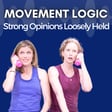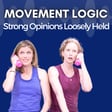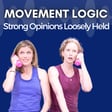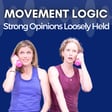
111: Make Stacy Sims Make Sense
In this episode, Laurel and Sarah take a look at one of the most influential and controversial voices in women’s health: Dr. Stacy Sims. Known for the phrase “women are not small men,” Sims has built her brand on the idea that women need entirely different training and nutrition strategies than men.
Laurel and Sarah trace Sims’ rise to prominence, the research she leans on, and the rhetorical playbook she uses on major platforms like the Mel Robbins Podcast, and the Huberman Lab podcast. They examine how Sims’ is able to persuade listeners of her ideas, even though her catchy slogans and bold claims outpace the evidence.
Rather than just fact-checking Sims’ most dubious claims on cycle syncing, fasted training, cardio, and how women should train, this episode instead focuses on how Sims’ messages are delivered. You’ll listen for how Sims’ and the hosts of these podcasts frequently employ persuasive tactics like appeals to authority, fearmongering, absolutist framing, pseudo-feminist virtue signaling, and what Laurel and Sarah call “mechanism theater” can make the weak evidence and shaky reasoning behind the claims sound stronger than it is. These strategies aren’t unique to Sims; you’ll start noticing these persuasive tactics everywhere, especially in menopause marketing and wellness content online.
SIGN UP for the FREE CLASS for Bone Density Course
FOLLOW @MovementLogicTutorials on Instagram
RESOURCES
110: Fact-Checking Female-Specific Training & Nutrition Advice with Dr. Lauren Colenso-Semple, PhD
Debate between Sims and Colenso-Semple on Docs Who Lift
Post Debate Interview on Barbell Medicine
109: Hot Flashes, Cold Facts: Menopause Myths that Won’t Die
62: Make McGill Make Sense
Social Post from Dr. Colenso-Semple about choice to use mechanistic, rat, or men’s data
108: Breathing for Bone Density? YogaU Cannot Be Serious
108: Does it Have to be Heavy? Rethinking the Lift Heavy Shit Narrative
98: Capacities for Longevity Part 3 - Cardio



